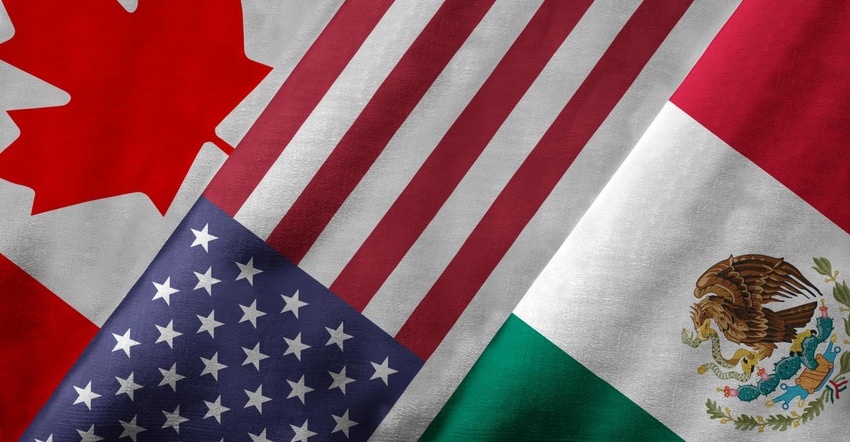
The fifth round of NAFTA talks between the United States, Mexico and Canada unofficially opened on Wednesday, two days before today’s official opening (Friday, Nov. 17), to give negotiators a chance to discuss technical issues prior to opening discussions over trade issues to be covered during the five day meeting.
Missing from the fifth round of talks are the primary trade ministers from all three members of the trilateral agreement. According to a news release last week, Canadian Foreign Affairs Minister Chrystia Freeland, U.S. Trade Representative Robert Lighthizer, and Mexican Secretary of the Economy Ildefonso Guajardo Villarreal indicated they do not see the need to meet in person for this round of talks since they held bilateral discussions on the sidelines of the APEC summit last week in Vietnam.
According to Canada's CBC News, "chief negotiators from Mexico, the United States and Canada will be in constant communication with their respective ministers and will report on the progress reached in Round 5."
As the meetings got underway in Mexico City, several major issues loom as possible stumbling blocks for negotiators, primarily the agricultural sector, access to markets, digital commerce rules of origin, and intellectual property. Very little progress has been made on these issues in the four sessions staged since talks got underway in August.
Also, officials following the talks believe issues involving telecommunications, public purchases, and solutions to commercial conflicts could also prove to be problematic as the negotiations move forward.
Nearly 30 negotiating groups are meeting during this fifth round of the talks, scheduled to conclude on November 21.
CONCERN OVER U.S. DEMANDS
Overshadowing this fifth session, however, are growing concerns over tough U.S. demands presented at the close of the fourth round, especially a proposal that includes a sunset clause that would kill the trade deal if it is not renegotiated after five years. Mexican and Canadian negotiators, along with some critics within the U.S. business sector, have expressed concern over such a clause, complaining it could undermine long-term investments.
In a late hour counter proposal, Reuters is reporting Mexican officials are proposing a five-year review of the agreement instead of a sunset clause. A review process, they argue, would help to shore up concerns expressed by investors but still allow trade partners to evaluate the effectiveness of the agreement and how well it is or isn't working before calling for another difficult renegotiating process if it isn't needed.
Trade officials in both Canada and Mexico have expressed concern that this fifth round of talks will be decisive in determining if the negotiations continue.
Meanwhile, tensions over a possible U.S. withdrawal from NAFTA appear to be building with more agricultural industry and business representatives expressing concerns that the latest U.S. demands put the agreement at risk, a development a growing number of NAFTA supporters say could be devastating, especially for farmers and other U.S. agricultural producers.
WITHDRAWAL FROM NAFTA DEVASTATING
According to the Financial Times, "American lawmakers have escalated their campaign against the Trump administration’s handling of the NAFTA negotiations." The Times reported a trio of Republican senators drafted a letter expressing their concerns that the latest demands threaten to upset delicate negotiations, and another 72 lawmakers in the House have also signed a separate letter concerning the importance of the NAFTA agreement to U.S. business and industry.
These letters follow a growing number of objections expressed by farm groups and other industry leaders that the Administration's tough demands could signal an end to a 24 year agreement that has proven to be successful and profitable to U.S. interests. Similar letters by farm support groups were drafted last week indicating that the U.S. agriculture sector is increasingly concerned about losing free trade relations with Canada and Mexico.
In response, however, U.S. Secretary Wilbur Ross shot back at farmers saying their objections threaten to undermine the United States' position in the negotiating process, comments that have not fared well with agricultural supporters.
Also, Politico is reporting that "Agriculture Secretary Sonny Perdue walked back comments that he is talking with Trump administration officials and Congress about a contingency plan for farmers should the U.S. decide to withdraw" from the NAFTA agreement. Perdue told the Des Moines Register he was only thinking out loud when he made comments to reporters about such a contingency plan.
But the comments have struck at the heart of concerns expressed by farmers that the Administration may already be planning to abandon negotiations and withdraw from the trade pact, a move that could do to great harm to many producers.
All eyes are now focused on Mexico City for this fifth round of talks in hopes that negotiators can come to terms over differences expressed following the close of the last round. But the concerns of U.S. agricultural producers continue to mount over the possibility they may lose trilateral trade they have come to depend upon, especially at a time when crop prices are down and global trade becomes more competitive.
About the Author(s)
You May Also Like






